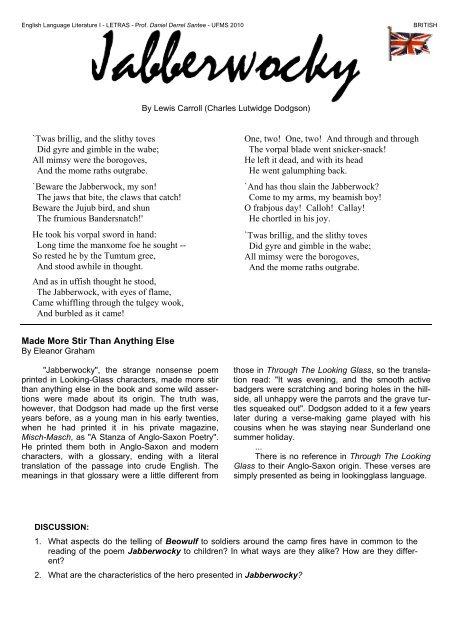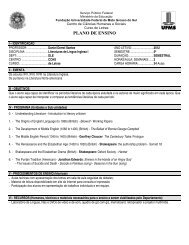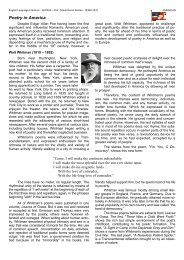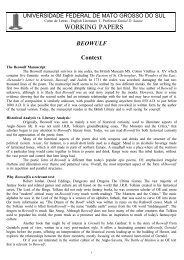`Twas brillig, and the slithy toves Did gyre and gimble in the wabe ...
`Twas brillig, and the slithy toves Did gyre and gimble in the wabe ...
`Twas brillig, and the slithy toves Did gyre and gimble in the wabe ...
You also want an ePaper? Increase the reach of your titles
YUMPU automatically turns print PDFs into web optimized ePapers that Google loves.
English Language Literature I - LETRAS - Prof. Daniel Derrel Santee - UFMS 2010 BRITISH<br />
<strong>`Twas</strong> <strong>brillig</strong>, <strong>and</strong> <strong>the</strong> <strong>slithy</strong> <strong>toves</strong><br />
<strong>Did</strong> <strong>gyre</strong> <strong>and</strong> <strong>gimble</strong> <strong>in</strong> <strong>the</strong> <strong>wabe</strong>;<br />
All mimsy were <strong>the</strong> borogoves,<br />
And <strong>the</strong> mome raths outgrabe.<br />
`Beware <strong>the</strong> Jabberwock, my son!<br />
The jaws that bite, <strong>the</strong> claws that catch!<br />
Beware <strong>the</strong> Jujub bird, <strong>and</strong> shun<br />
The frumious B<strong>and</strong>ersnatch!'<br />
He took his vorpal sword <strong>in</strong> h<strong>and</strong>:<br />
Long time <strong>the</strong> manxome foe he sought --<br />
So rested he by <strong>the</strong> Tumtum gree,<br />
And stood awhile <strong>in</strong> thought.<br />
And as <strong>in</strong> uffish thought he stood,<br />
The Jabberwock, with eyes of flame,<br />
Came whiffl<strong>in</strong>g through <strong>the</strong> tulgey wook,<br />
And burbled as it came!<br />
Made More Stir Than Anyth<strong>in</strong>g Else<br />
By Eleanor Graham<br />
"Jabberwocky", <strong>the</strong> strange nonsense poem<br />
pr<strong>in</strong>ted <strong>in</strong> Look<strong>in</strong>g-Glass characters, made more stir<br />
than anyth<strong>in</strong>g else <strong>in</strong> <strong>the</strong> book <strong>and</strong> some wild assertions<br />
were made about its orig<strong>in</strong>. The truth was,<br />
however, that Dodgson had made up <strong>the</strong> first verse<br />
years before, as a young man <strong>in</strong> his early twenties,<br />
when he had pr<strong>in</strong>ted it <strong>in</strong> his private magaz<strong>in</strong>e,<br />
Misch-Masch, as "A Stanza of Anglo-Saxon Poetry".<br />
He pr<strong>in</strong>ted <strong>the</strong>m both <strong>in</strong> Anglo-Saxon <strong>and</strong> modern<br />
characters, with a glossary, end<strong>in</strong>g with a literal<br />
translation of <strong>the</strong> passage <strong>in</strong>to crude English. The<br />
mean<strong>in</strong>gs <strong>in</strong> that glossary were a little different from<br />
By Lewis Carroll (Charles Lutwidge Dodgson)<br />
One, two! One, two! And through <strong>and</strong> through<br />
The vorpal blade went snicker-snack!<br />
He left it dead, <strong>and</strong> with its head<br />
He went galumph<strong>in</strong>g back.<br />
`And has thou sla<strong>in</strong> <strong>the</strong> Jabberwock?<br />
Come to my arms, my beamish boy!<br />
O frabjous day! Calloh! Callay!<br />
He chortled <strong>in</strong> his joy.<br />
<strong>`Twas</strong> <strong>brillig</strong>, <strong>and</strong> <strong>the</strong> <strong>slithy</strong> <strong>toves</strong><br />
<strong>Did</strong> <strong>gyre</strong> <strong>and</strong> <strong>gimble</strong> <strong>in</strong> <strong>the</strong> <strong>wabe</strong>;<br />
All mimsy were <strong>the</strong> borogoves,<br />
And <strong>the</strong> mome raths outgrabe.<br />
those <strong>in</strong> Through The Look<strong>in</strong>g Glass, so <strong>the</strong> translation<br />
read: "It was even<strong>in</strong>g, <strong>and</strong> <strong>the</strong> smooth active<br />
badgers were scratch<strong>in</strong>g <strong>and</strong> bor<strong>in</strong>g holes <strong>in</strong> <strong>the</strong> hillside,<br />
all unhappy were <strong>the</strong> parrots <strong>and</strong> <strong>the</strong> grave turtles<br />
squeaked out". Dodgson added to it a few years<br />
later dur<strong>in</strong>g a verse-mak<strong>in</strong>g game played with his<br />
cous<strong>in</strong>s when he was stay<strong>in</strong>g near Sunderl<strong>and</strong> one<br />
summer holiday.<br />
...<br />
There is no reference <strong>in</strong> Through The Look<strong>in</strong>g<br />
Glass to <strong>the</strong>ir Anglo-Saxon orig<strong>in</strong>. These verses are<br />
simply presented as be<strong>in</strong>g <strong>in</strong> look<strong>in</strong>gglass language.<br />
DISCUSSION:<br />
1. What aspects do <strong>the</strong> tell<strong>in</strong>g of Beowulf to soldiers around <strong>the</strong> camp fires have <strong>in</strong> common to <strong>the</strong><br />
read<strong>in</strong>g of <strong>the</strong> poem Jabberwocky to children? In what ways are <strong>the</strong>y alike? How are <strong>the</strong>y different?<br />
2. What are <strong>the</strong> characteristics of <strong>the</strong> hero presented <strong>in</strong> Jabberwocky?
English Language Literature - LETRAS - Prof. Daniel Derrel Santee - UFMS 2009 BRITISH<br />
The Development of Middle English (1066 - 1400)<br />
Historical Background<br />
In 1066, <strong>the</strong> Normans, from nor<strong>the</strong>rn part of<br />
France, <strong>in</strong>vaded Engl<strong>and</strong>. They brought with<br />
<strong>the</strong>m <strong>the</strong>ir civilization which was more organized<br />
<strong>and</strong> more <strong>in</strong>tricate than <strong>the</strong> Anglo-Saxon society<br />
<strong>and</strong> was organized under a Feudal system of<br />
government. It was a society prepared for war,<br />
not only with o<strong>the</strong>r countries but also between <strong>the</strong><br />
barons <strong>and</strong> nobles <strong>the</strong>mselves <strong>in</strong> frequent disputes<br />
for l<strong>and</strong>s.<br />
The church developed <strong>in</strong>to an <strong>in</strong>credibly<br />
powerful <strong>in</strong>stitution. It was a world of constant<br />
war, diseases <strong>and</strong> violence thus, <strong>the</strong> Medieval<br />
man turned to <strong>the</strong> Church. Membership <strong>in</strong> <strong>the</strong><br />
Church guaranteed for him a place <strong>in</strong> society; to<br />
be excommunicated meant to be ostracized from<br />
society. Education was <strong>the</strong> doma<strong>in</strong> of <strong>the</strong> Church;<br />
prior to <strong>the</strong> <strong>in</strong>vention of <strong>the</strong> pr<strong>in</strong>t<strong>in</strong>g press, manuscripts<br />
were tediously written down by h<strong>and</strong> <strong>in</strong> <strong>the</strong><br />
monasteries. Monks <strong>and</strong> priests were responsible<br />
for <strong>the</strong> dissem<strong>in</strong>ation of <strong>the</strong> culture of Greek <strong>and</strong><br />
Roman scholars as well as <strong>the</strong> teach<strong>in</strong>gs of <strong>the</strong><br />
Scriptures. Oxford <strong>and</strong> Cambridge came to formally<br />
be known as universities dur<strong>in</strong>g this period<br />
as early as <strong>the</strong> 12 th <strong>and</strong> 13 th centuries.<br />
The Church was also closely <strong>in</strong>volved <strong>in</strong><br />
political affairs. It was <strong>the</strong> medieval belief that<br />
Church <strong>and</strong> K<strong>in</strong>g were <strong>in</strong>struments of <strong>the</strong> Div<strong>in</strong>e<br />
scheme necessary for keep<strong>in</strong>g order <strong>in</strong> society. In<br />
1170 a famous dispute happened between K<strong>in</strong>g<br />
Henry II <strong>and</strong> <strong>the</strong> Archbishop of Canterbury, who<br />
was <strong>the</strong> head of <strong>the</strong> English Church, <strong>and</strong> some of<br />
<strong>the</strong> K<strong>in</strong>g’s supporters murdered <strong>the</strong> bishop Tho-<br />
Cultural Influences<br />
The Feudal system developed around <strong>the</strong><br />
Knight, <strong>the</strong> mounted warrior who became <strong>the</strong><br />
symbol of Chivalry. A well-born boy tra<strong>in</strong>ed to be<br />
a knight first as a page <strong>and</strong> <strong>the</strong>n as a squire to a<br />
lord. The lord's wife taught him <strong>the</strong> elaborate<br />
code of courtesy <strong>and</strong> manners which a knight<br />
needed to pursue. He practiced to be a horseman<br />
<strong>and</strong> ultimately was dubbed Knight <strong>and</strong> swore to<br />
uphold <strong>the</strong> code of Chivalry - loyalty to <strong>the</strong><br />
Church <strong>and</strong> K<strong>in</strong>g, <strong>and</strong> reverence towards ladies.<br />
The <strong>in</strong>stitution of Chivalry smoo<strong>the</strong>d <strong>the</strong> roughness<br />
of medieval life. It bound <strong>the</strong> frequently lawless<br />
warrior by a code. It promoted <strong>the</strong> status of<br />
woman <strong>and</strong> gave her a greater status <strong>in</strong> life <strong>and</strong><br />
<strong>in</strong> literature as well.<br />
Lat<strong>in</strong> <strong>and</strong> French verse used meter <strong>and</strong><br />
rhyme <strong>and</strong> <strong>the</strong>se were <strong>in</strong>troduced <strong>in</strong>to English<br />
mas A Becket <strong>in</strong>side <strong>the</strong> M<strong>in</strong>ster at Canterbury.<br />
He was canonized <strong>and</strong> Canterbury turned <strong>in</strong>to a<br />
favorite place of pilgrimage..<br />
The prevalent religious restlessness of <strong>the</strong><br />
Middle Ages <strong>in</strong>spired <strong>the</strong> famous religious<br />
movement known as <strong>the</strong> Crusades, whose object<br />
was to free <strong>the</strong> Holy L<strong>and</strong> from <strong>the</strong> Muslims.<br />
K<strong>in</strong>gs, knights <strong>and</strong> commoners united to rise <strong>in</strong><br />
<strong>the</strong> “Holy War”. Although <strong>the</strong> wars, which lasted<br />
two hundred years, were unsuccessful <strong>the</strong>y<br />
spurred a great number of men to explore <strong>the</strong><br />
world. Knights from <strong>the</strong> cold fortress castles of<br />
Engl<strong>and</strong> visited <strong>the</strong> palaces of Venice <strong>and</strong> saw<br />
<strong>the</strong> luxuriant cities of Asia M<strong>in</strong>or. Inspired on<br />
<strong>the</strong>se new horizons civilization advanced slowly.<br />
Gradually Engl<strong>and</strong> became unified. Wales<br />
was <strong>in</strong>corporated <strong>in</strong>to <strong>the</strong> Crown, it took many<br />
years for Scotl<strong>and</strong>, which was <strong>in</strong>habited by tough<br />
Celts, to be subdued, however. The wool-trade<br />
helped Engl<strong>and</strong> to develop but <strong>the</strong> French <strong>in</strong>terfered<br />
with English shipp<strong>in</strong>g. This resulted <strong>in</strong> <strong>the</strong><br />
100 Years War between <strong>the</strong> France <strong>and</strong> Engl<strong>and</strong>.<br />
Ultimately Engl<strong>and</strong> lost <strong>the</strong> war <strong>and</strong> lost her part<br />
<strong>in</strong> <strong>the</strong> French territory, but one beneficial effect<br />
resulted: it ended <strong>the</strong> quarrels between Normans<br />
<strong>and</strong> Anglo-Saxons; <strong>the</strong>n all were Englishmen.<br />
The Feudal system gradually began to fall<br />
apart as <strong>the</strong> economy prospered. Craftsmen<br />
jo<strong>in</strong>ed toge<strong>the</strong>r <strong>in</strong> guilds <strong>and</strong> serfs began to f<strong>in</strong>d<br />
freedom. The powers <strong>and</strong> methods of <strong>the</strong> Church<br />
were be<strong>in</strong>g questioned as well as <strong>the</strong> idea that<br />
man had a fixed place <strong>in</strong> society.<br />
poetry. Dur<strong>in</strong>g this period ballads were very<br />
popular <strong>and</strong> were sung <strong>and</strong> danced to by <strong>the</strong><br />
common people. The ballad narratives were direct<br />
<strong>and</strong> swift mov<strong>in</strong>g <strong>and</strong> usually concerned<br />
love, courage, enmity <strong>and</strong> death, for death was<br />
part of <strong>the</strong> everyday pattern of medieval life. The<br />
ballad <strong>in</strong>troduced verse, refra<strong>in</strong> <strong>and</strong> chorus,<br />
which rema<strong>in</strong> <strong>the</strong> essential elements of popular<br />
songs even today.<br />
Poems of Allegory <strong>and</strong> Courtly Romance<br />
were popular among <strong>the</strong> elite. Medieval allegory<br />
had a moral purpose <strong>and</strong> usually took <strong>the</strong> form of<br />
a dream narrative with a moral mean<strong>in</strong>g. Courtly<br />
love romances of French orig<strong>in</strong> stemmed from<br />
<strong>the</strong> code of Chivalry <strong>and</strong> <strong>the</strong> formalized <strong>and</strong> ritualized<br />
code of conduct towards women, much of<br />
which still exists today.
The Development of <strong>the</strong> Language<br />
At first <strong>the</strong> rul<strong>in</strong>g Normans replaced Old<br />
English with French which was <strong>the</strong>ir own language.<br />
French <strong>the</strong>n became <strong>the</strong> official language<br />
but was never adopted as <strong>the</strong> common language<br />
due to <strong>the</strong> class difference between <strong>the</strong> Anglo-<br />
Saxons <strong>and</strong> <strong>the</strong> Normans <strong>and</strong> <strong>the</strong> great numerical<br />
superiority of <strong>the</strong> latter. Fur<strong>the</strong>r wars aga<strong>in</strong>st<br />
<strong>the</strong> French <strong>in</strong>creased nationalist sentiments <strong>and</strong><br />
a tolerance of Old English. As <strong>the</strong> society prospered,<br />
English spread up from <strong>the</strong> base <strong>and</strong> <strong>in</strong><br />
1362 English was declared <strong>the</strong> official language.<br />
French <strong>and</strong> English grammars differed<br />
greatly <strong>and</strong> could not be blended. The English<br />
grammatical plan emerged although <strong>the</strong> <strong>in</strong>fluence<br />
of French words upon <strong>the</strong> English vocabulary<br />
was extensive. As <strong>the</strong> Saxon <strong>and</strong> Norman societies<br />
merged, more <strong>and</strong> more French words, because<br />
<strong>the</strong>y were more expressive <strong>and</strong> extensive,<br />
were <strong>in</strong>troduced <strong>in</strong>to English.<br />
The difference <strong>in</strong> relations between <strong>the</strong><br />
Normans <strong>and</strong> <strong>the</strong> Saxons can be seen from <strong>the</strong><br />
Saxon names for <strong>the</strong> food animals which <strong>the</strong><br />
Saxons tended, on <strong>the</strong>ir farms, <strong>and</strong> <strong>the</strong> French<br />
names for <strong>the</strong> meats <strong>the</strong> Normans ate at <strong>the</strong> d<strong>in</strong>ner<br />
table; Deer-Venison, Pig-Pork, Cow-Beef,<br />
Calf-Veal, Sheep-Mutton.<br />
French words relat<strong>in</strong>g to government, law<br />
<strong>and</strong> bus<strong>in</strong>ess were also adopted; such as crown,<br />
state, courtier, justice, equality, felony, petition,<br />
executioner. As <strong>the</strong> cultural <strong>in</strong>terests <strong>and</strong> opportunities<br />
of <strong>the</strong> Saxons grew, many cultural ideas<br />
<strong>and</strong> more words <strong>in</strong> <strong>the</strong> areas of literature, art,<br />
medic<strong>in</strong>e, fashion <strong>and</strong> social life were added from<br />
<strong>the</strong> French.<br />
English became more simplified from 1066<br />
to 1400. It became a language of relatively few<br />
<strong>in</strong>flections, <strong>and</strong> different word end<strong>in</strong>gs to express<br />
grammatical relationships lost <strong>the</strong>se dist<strong>in</strong>ctions.<br />
For <strong>in</strong>stance 'good' <strong>in</strong> A.D. 700 had ten different<br />
forms, by 1350 it was down to two <strong>and</strong> shortly after<br />
only one. As end<strong>in</strong>gs were dispensed with, <strong>the</strong><br />
grammatical relationships which <strong>the</strong>y expressed<br />
were taken over by patterns <strong>and</strong> arrangements of<br />
words, so that Modern English has become a<br />
phrasal language more than an <strong>in</strong>flected language.<br />
The most important city was London <strong>and</strong> for<br />
that reason <strong>the</strong> dialect spoken <strong>in</strong> that part of Engl<strong>and</strong><br />
came to be considered <strong>the</strong> 'K<strong>in</strong>g's English' -<br />
<strong>the</strong> official dialect of Engl<strong>and</strong>. It was <strong>in</strong> this dialect<br />
that <strong>the</strong> famous author Chaucer chose to write <strong>in</strong><br />
1370. A century later, Caxton, who <strong>in</strong>troduced<br />
pr<strong>in</strong>t<strong>in</strong>g to Engl<strong>and</strong>, used <strong>the</strong> speech of London<br />
as <strong>the</strong> st<strong>and</strong>ard for pr<strong>in</strong>t<strong>in</strong>g, thus fur<strong>the</strong>r establish<strong>in</strong>g<br />
this dialect as 'St<strong>and</strong>ard' English.<br />
The Ballad<br />
The text below is ‘The Ballad of Bonnie George Campbell', a traditional Scotish ballad which<br />
describes <strong>the</strong> frequent tragedy of border warfare which took place between <strong>the</strong> Scots <strong>and</strong> <strong>the</strong> English.<br />
The song appeared <strong>in</strong> Smith's 'Scottish M<strong>in</strong>istrel' 1820-1824 - but <strong>the</strong>re is no identification of George<br />
Campbell, a member of one of <strong>the</strong> Great Scots clans, however, he obviously met a sticky end, lead<strong>in</strong>g<br />
to this lament<br />
The Ballad of Bonnie George Campbell<br />
Hie upon Hielan’s 1 <strong>and</strong> laigh 2 upon Tay 3 ,<br />
Bonnie George Campbell rade oot on a day,<br />
Saddled <strong>and</strong> bridled, sae gallant tae see,<br />
Hame 4 cam' his guid horse but never cam’ he.<br />
5 Saddled <strong>and</strong> bridled <strong>and</strong> booted rade he,<br />
A plume <strong>in</strong> his helmet, a sword at his knee.<br />
But toom 5 cam’ his saddle a’ bluidy tae see,<br />
Hame cam’ his guid horse but never cam’ he.<br />
1 Highl<strong>and</strong>s.<br />
2 low.<br />
3 river <strong>in</strong> Scotl<strong>and</strong> flow<strong>in</strong>g down from <strong>the</strong> Highl<strong>and</strong>s <strong>in</strong>to<br />
<strong>the</strong> North Sea at Perth.<br />
4 home.<br />
5 empty.<br />
Doon ran his auld mi<strong>the</strong>r greet<strong>in</strong>’ 6 fu’ 7 sair 8 ,<br />
10 Oot ran his bonnie bryde reiv<strong>in</strong>’ 9 her hair.<br />
"My meadow lies green <strong>and</strong> my corn is unshorn<br />
My barn is tae build <strong>and</strong> my babe is unborn."<br />
Hie upon Hielan’s <strong>and</strong> laigh upon Tay,<br />
Bonnie George Campbell rade oot on a day.<br />
15 Saddled <strong>and</strong> bridled, sae gallant tae see,<br />
Hame cam’ his guid horse but never cam’ he.<br />
6 griev<strong>in</strong>g.<br />
7 full.<br />
8 sorely.<br />
9 pull<strong>in</strong>g out.<br />
DISCUSSION:<br />
3. How is <strong>the</strong> style of writ<strong>in</strong>g <strong>in</strong> <strong>the</strong> ballad different from Anglo-Saxon epic verse?<br />
4. State <strong>the</strong> poetic devices which are used <strong>in</strong> this ballad.<br />
5. How is <strong>the</strong> narrative typical of ballads? In what way is it effective?<br />
6. How does this ballad reflect <strong>the</strong> society <strong>and</strong> times <strong>in</strong> which it is written?





